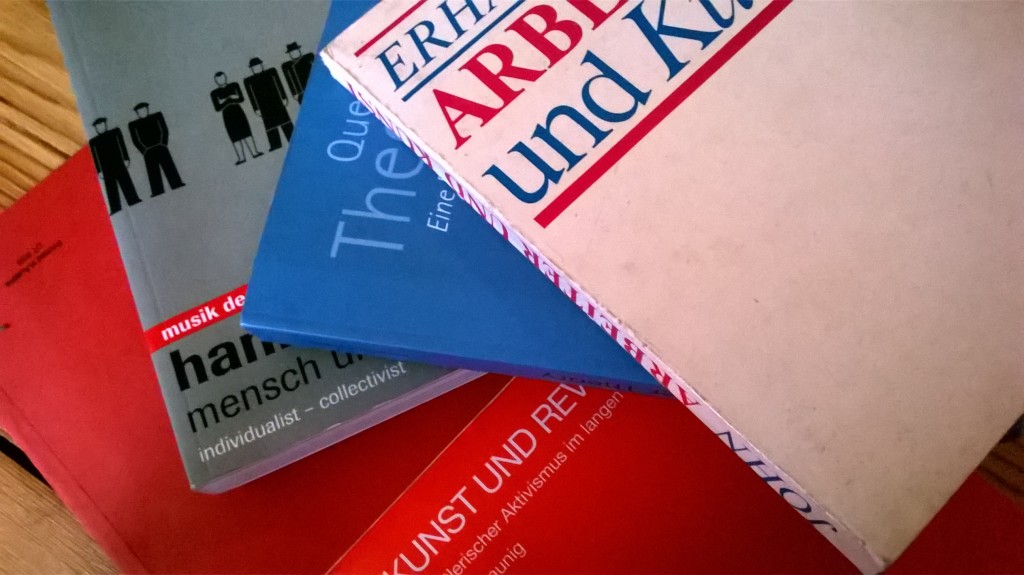
Music is always embedded in the context of society. We will meet to discuss different topics in music about once a month. The discussion will flow into an active creation of music whenever appropriate. This will be a discussion about and with music.
Monday 14th of October 2024, 7 p.m.: Discussion evening about the 1920s
Cultural and social awakening of the 1920s – inspiration for the present and future or boring retro?
For a long time, the 1920s were clichéd as the “Golden Age” and were reactivated in boring-excited performances. Recently, however, hindsight has increasingly been seen as a warning that social regression can happen at any time and is partly happening at the moment. Using musical protagonists of the time such as Claire Waldorf or Hanns Eisler, we want to discuss this evening what contribution the music and cultural sector can make so that emancipatory developments can continue to advance and what that can mean for today.
With advance registration! Please register at least 7 days in advance.
The Frizu Lounge is looking forward to a stimulating discussion.
Discussion in spoken German, whispered translation in English possible.
The discussion evening is free of charge, donations for room rental are welcome.
Discussions in the past:
Tuesday, 5th of March 2024
Discussion evening on Women*Day:
Criticism of the stage from a queer-feminist perspective
Isn’t “stage” itself a patriarchal place?
How could progressive, collaborative forms of music-making be established?
A queer-feminist strategy in the music sector is to bring more queers and women* onto the stages. As long as stages play such an important role in cultural life, this certainly makes sense. At the same time, however, the question arises as to whether the “stage” itself is not a patriarchal place. The edge of the stage divides into top and bottom, active and passive. He showers those at the top with “false” recognition and strengthens hierarchical structures. Unfortunately, more communal forms of music are often found in backward-looking forms (keyword: singing club). But how could progressive, collaborative forms of music-making be established? Are there any suggestions from the 1920s? Which forms are already cultivated in the Frizu Lounge and how could they be further developed?
Thursday, 19th of March 2020:
Hits and Classism
Classism means discrimination on the basis of social origin and is mainly aimed at members of a “lower” social class. Such devaluations can also be read out when dealing with the music genre Schlager. Aesthetic criticism on the musical level often conceals reservations that exist on completely non-musical levels. How does taste in music contribute to the maintenance of social divisions? And why is listening to hits something that some people prefer to do secretly? We want to talk about that this evening.
Discussion in German spoken language, whisper translation in English possible.
cancelled
Thursday, 27th of February 2020:
Experimental music and politics
Free jazz in the 1970s was associated with the emergence of the political ideas of the time. The idea of revolutionizing musical material was related to the idea of changing society. Earlier and current forms of experimental music can also be seen in this context.Can questioning musical norms also question other social norms? Does acting only remain in the concert hall or can it have an effect beyond? Emancipatory practice or sophisticated art?
Discussion in German and English spoken language
Thursday 23rd of January 2020:
Political music?
When is music political? What can political music look like? Isn’t all music political? Who should and can be addressed by the music? And what does that mean for the music and the lyrics? What handling can be found for the typical things in the music business (self-marketing, gender stereotypes, “quality standards”)? Can and should the contrast between stage and audience be softened? How can more progressive, collective forms of making music be realized?
Thursday 29th of August 2019:
MUSIC and EVERYDAY LIFE
When do I listen to music? On which stations? Or live? At which events? (When) do I play music? When do I pay for music? When do I not pay for music? And what is music anyway? This is the kick-off event for the discussion series about music.
Thursday 19th of September 2019:
MUSIC and CLASS
Nowadays, class is being discussed more and more. Does it make sense touse this term? How does your background impact the ways in which you deal with music? How is society structured with the help of the music business? How is identity strengthened? And who profits from this?
Thursday 24th of October 2019:
MUSIC and GENDER
Rock stages full of men. Conductors’ podiums as well. The same holds true for switchboards and in subculture. Women* may sing, and they are free to dance. Queers must be gaudy. – STOP! It is time for a change, isn’tit?
Thusrday 21st November 2019:
MUSIC and QUALITY
What is musical quality? And who decides this? And why? When is music enjoyed (when do I like music)? What is “good music” (in my opinion)? When do I feel “good” about music? And what defines the “good” life?
Discussion in german and english
